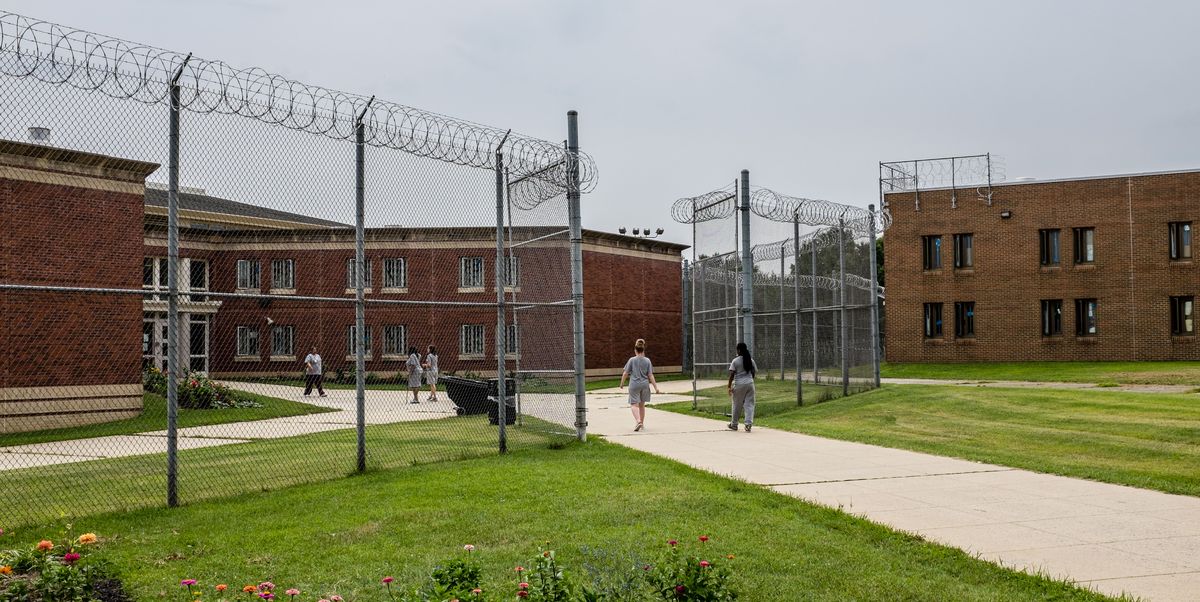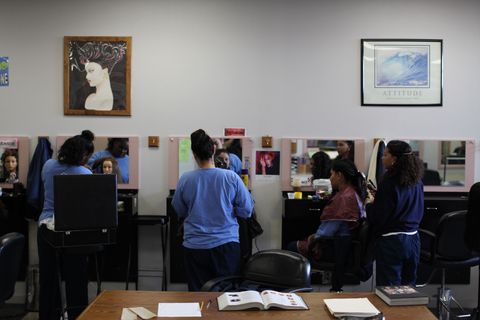Peering through the thick bars cutting a horizontal strata in the window, I watch the streams of fog soften the edges of the housing unit’s silhouettes lined up outside. Towering stadium lights illuminate the prison grounds when it is dark; this morning they beam a soft light through the mist. This is what mass incarceration looks like at 5:00 am.
Turning on the lamp that’s fastened to the metal frame of my prison bunk, I adjust the coarse, orange fabric of the prison-issued face mask I’ve tied over it. Transformed from Covid-19 mitigation, it’s now infusing my bunk area with a calming marmalade glow. I’ve found that it softens the reality of the cold cinder block wall that runs the length of my lumpy mattress. I live in a room that often holds eight women at a time, in a space the size of a one car garage.
That anything related to Covid-19 is calming is ironic; prisons are a nightmare scenario for an out-of-control virus. 1 in 5 incarcerated people in the United States has tested positive for the coronavirus, which is four times higher than the general population. In California, where I’m incarcerated, that rate is one in 4.
I know that I engineered my current circumstances by breaking the law, but nobody saw this pandemic coming. Being sentenced to years in prison is different than the very the very real possibility of death at the hands of neglectful and uncaring correctional institutions.
I have to go to breakfast to get food. This requires walking between a gauntlet of staff who are clustered on both sides of a narrow sidewalk leading to the chow hall. I note that many of their masks are carelessly dangling off their chin. The institution says we should report any staff not in compliance with COVID mitigation practices but we know that will result in backlash— probably harassment or our room getting searched.
This morning, when I saw that there wouldn’t be six feet between us, I considered quoting public health messaging. Time in prison, however, has taught me to think through these urges and I reconsidered taking on five correctional officers who clearly weren’t concerned about the coronavirus. I held my breath as I walked by, grateful for the mask that hid equal parts frustration and fear.
I’ve been incarcerated for 30 years and I’ve never seen my community suffer like this. Entire rooms of eight women are regularly plucked out of the housing unit and sent to quarantine after a potential exposure. For 14 days, they sit in two-person cells made up of three narrow cinder block walls that feel like they’re closing in on you. They’re so small that you can touch your bunk and the wall at the same time. You wouldn’t want to actually touch the wall though, they’re smeared with pencil led from previous women using them as a pencil sharpener, or they’re encrusted with dried globs of cheap toothpaste that were used as glue to pin up photos of loved ones or a funny comic sent in the mail. There’s no electricity for appliances, there’s no phone calls or laundry access, we can’t power the tablets we rely on for precious contact with family and the outside world. To us, these Covid quarantine rooms are dungeons.
A woman I’ve known for over 20 years recently returned from quarantine. Usually she is spiritual and encouraging and sedate, always ready with a Bible quote from the Christian books she’s constantly reading. When she returned from quarantine with her roommates, we could see the change in their face and in their spirit.
About a week after she returned, we were both in the medical clinic waiting to be seen. She sat across from me on the stainless steel benches, quietly looking at the ground. Over two decades, we’ve worked together and lived in the same housing unit and shared many conversations. When she started to talk this time, I heard something out of character reflected in her voice and on her face: she was outraged. I saw anger skim across her face in a way I’ve never seen before. Uneasily, I imagined what must have happened to her to mark her this way.
We live in four day chunks of dread— the length of time it takes to get our Covid-19 test results. Each time, we fear learning that someone in our room has tested positive; it’s like living a game of Russian Roulette. We’re haunted by the specter of a positive test, of whose room will be relocated to the quarantine unit next.
This virus is a microscopic presence unseen on every surface. Each time a woman tests positive we all think: did I sit on a couch near her? Did I stand next to her while signing up for phone time? Did I use the kiosk or washing machine after her?
Three days ago, my friend who lives in a room across the hall just a few feet away tested positive. Our whole room knows her, she’s someone we regularly talk to and eat lunch with. One of my roommates even works with her in the Prison Dental Lab. She and I had chatted a week earlier, standing next to each other in the Dayroom and discussing how we were both handling quarantine. It was 7:40 pm and we were sitting on our bunks when the sound of an officer’s footsteps on concrete echoed on the hallway floor. Then, we heard a scraping sound as the staff unlocked the heavy metal door to her room before the officer leaned into the doorway to call her last name and tell her it was time to go.
My roommates and I peered through our room window, watching our friend step out of her room carrying a large plastic garbage bag filled with her belongings. I could see faces at every window in our hall. Soon, voices began to echo through the cracks in the doorways. Multiple voices overlapped, saying we loved her, to stay strong, that we were praying for her and were planning a big meal to celebrate her return in 14 days.
Afterwards, we sat in our room sharing our own version of ‘contact tracing’ information, each of us suddenly realizing what it could mean. Our cell grew very quiet, each of us considering the encroaching inevitability.
That night, after the 9:30 pm security count, I laid on my bunk wondering how my friend was doing. I pictured her in a quarantine room with no electricity, no television, with strangers she didn’t know. I thought about how this could be my future. I struggled with the reality that this virus was at my front door and probably in my room. The stress was a tangible weight, an inescapable reality of the things and decisions outside of our control that were risking our lives.
Overwhelmed by it all, I distracted myself by watching Saturday Night Live— a chuckle finally emerged at a Rudy Guliani skit. Cracking open a box of cheese crackers and a bag of plain potato chips I thought about how there’s nothing like the old fashioned coping strategy of emotional eating. Self-care is not self-indulgent, I thought, it is self-preservative. As I crunched away at my snacks and allowed the comedy to distract my rapid thoughts, I realized I had reached a point of relenting to what I had no control over. I had surrendered to the uncertainty of my circumstances. Really, it was the only choice I had left.
The next day, each room received a list of what we were allowed to take with us if our test came back positive and we were sent to quarantine.
A few weeks ago, my roommate came over to my bunk. She perched on its metal edge and asked if she could talk to me. She was fresh from work. At first, when prison workers were designated “essential workers,” many women were grateful because they were so eager to finally get out of their rooms and go somewhere else in the prison. Before Covid-19, it was common to attend self-help groups in the Chapel or the Visiting Room. We had weekly medical appointments, night time college classes and Narcotics Anonymous meetings. Now that’s all gone. Having a job assignment to help fill 23 hours of lockdown every day feels like a gift— even if the work only pays 8 cents to 90 cents an hour.
My roommate started to cry as she revealed the fear and stress of being forced to report to her job at the Prison Industries Dental Lab where she’s assigned along with 17 other women in my unit. They had all recently learned that their supervisor had tested positive for Covid-19. She had been worried about his habit of resting his face mask below his mouth for weeks.
Two days later, when the women returned to work after a brief hiatus it didn’t appear that the dental lab had been disinfected. All day, they talked about where the virus might still be, the fear and uncertainty wearing on them
My roommate is generally a bright breath of happy and joyful energy, but the day and the oppressive mood of her coworkers had taken a toll. Once she stepped into the calm and safety of our room, she cracked. Her voice was shaky and strained as she told me she couldn’t take it, she had tried to be strong and support the other women all day but it was too much; her head dropped and the tears came. She was broken.
I looked at my roommate, fresh from coming from her job with her dark eyes filled with the weight of working in a place most likely infected with Covid-19 and though I was acutely aware of how close she was in proximity to me. Could it be on her clothes, I wondered? And as I looked at her tears and the angst carved into her face, I pulled her to me and hugged her. Even while I wondered if there could be virus in her hair, I tucked her head under my chin. As my arms went around in an offer of comfort a small thought occurred to me, I wondered if I was now infected? I hugged her anyway.
This content is created and maintained by a third party, and imported onto this page to help users provide their email addresses. You may be able to find more information about this and similar content at piano.io

